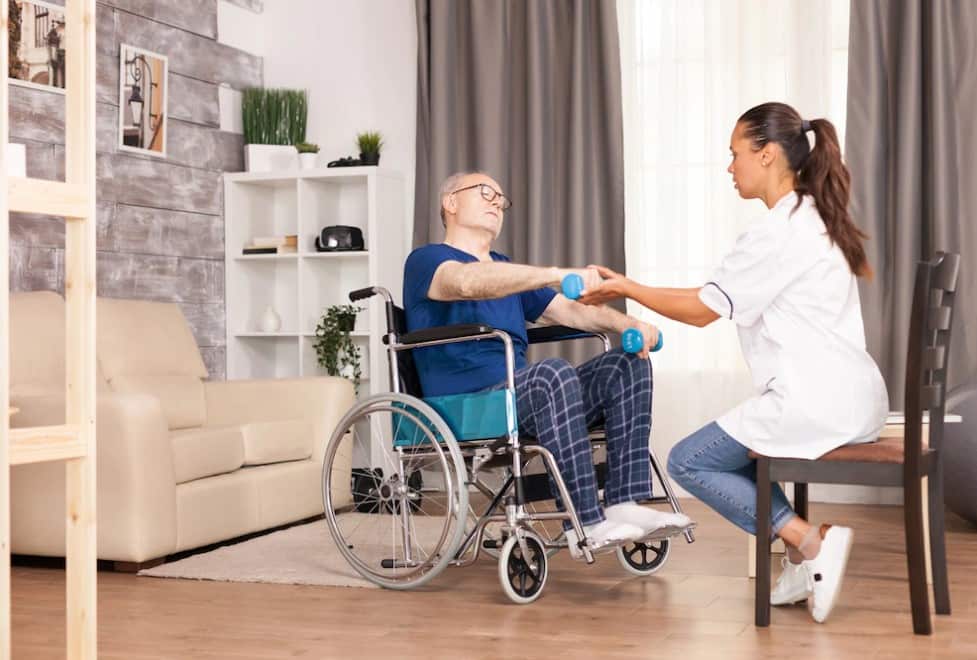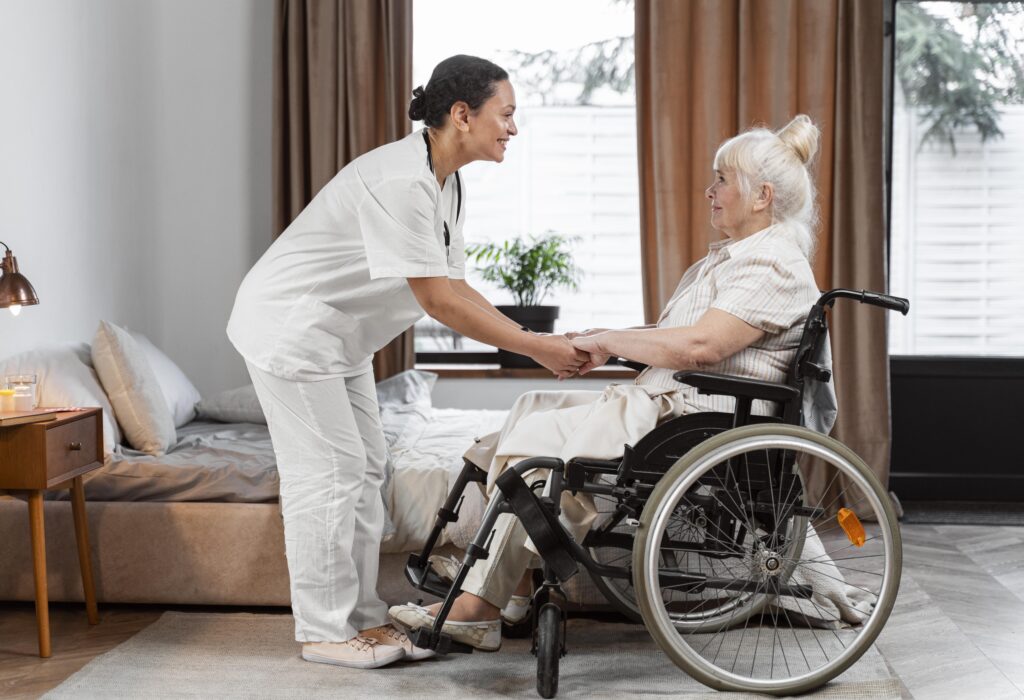Ten compelling reasons why ndis providers are reshaping disability support at home
Ten compelling reasons why ndis providers are reshaping disability support at home
Blog Article
The Importance of Disability Providers and the Effect of Home Treatment Providers
Disability solutions are important for boosting the lives of individuals with handicaps. They offer crucial support that cultivates self-reliance and health. Home treatment carriers play a vital role in this structure by providing tailored aid customized to one-of-a-kind needs. This assistance not only advantages people yet also alleviates the strain on family caretakers. Recognizing these dynamics discloses a deeper connection between area, autonomy, and treatment. What lies ahead for these crucial services and their impact?
Recognizing Handicap Solutions
While numerous might not fully understand the intricacies of handicap solutions, they play a crucial role in improving the lifestyle for individuals with impairments. These services incorporate a wide array of support group created to help individuals in navigating daily challenges. From providing access to education and work chances to facilitating health care and recovery, handicap solutions intend to advertise independence and inclusion.Key elements consist of instance monitoring, advocacy, and assistive modern technology, which assist individuals achieve individual goals. Furthermore, community-based programs usually foster social connections, lowering feelings of isolation. Various organizations and federal government entities team up to assure that individuals get tailored assistance according to their distinct requirements. Recognizing these solutions is crucial, as they equip people with disabilities to lead fulfilling lives, actively get involved in their neighborhoods, and realize their potential. Inevitably, efficient impairment solutions are fundamental to promoting equity and access for all.

The Function of Home Treatment Providers
Home care suppliers play an essential function in delivering individualized assistance to individuals with disabilities, enabling them to maintain self-reliance in their own homes - disability support. These professionals offer a variety of solutions tailored to satisfy the special requirements of each person, ensuring that assistance is both efficient and pertinent. They help with day-to-day tasks such as dish prep work, individual hygiene, and medicine administration, which are essential for improving the top quality of life for those they serve.Moreover, home treatment carriers function as an important link between individuals and their healthcare needs, promoting communication with doctor and collaborating needed services. Their existence additionally eases the worry on household caregivers, promoting a healthier vibrant within households. By promoting a safe and encouraging atmosphere, home treatment suppliers encourage individuals with handicaps to engage with their communities, go after personal interests, and ultimately lead satisfying lives while staying in the comfort of their homes
Personalized Care and Assistance
Personalized care and assistance are vital parts of effective home treatment solutions, as they cater to the specific needs and preferences of everyone with an impairment. Home care carriers analyze the one-of-a-kind requirements of each client, developing customized plans that prioritize their convenience, well-being, and health. This customized approach not just improves the top quality of care however additionally promotes a feeling of self-respect and respect.Caregivers are educated to adapt their techniques, guaranteeing that services line up with the client's lifestyle, cultural history, and individual choices. Regular interaction in between customers and caretakers assists to fine-tune treatment plans, attending to any type of altering needs quickly. Furthermore, the concentrate on individualized assistance urges the growth of trust and connection, which can greatly improve the total caregiving experience. Inevitably, personalized care and assistance encourage people with handicaps to obtain the aid they need in a manner that feels respectful and verifying.
Enhancing Freedom for Individuals
Enhancing self-reliance for individuals with disabilities is an essential goal within home care services. These services provide tailored assistance that empowers customers to participate in daily tasks autonomously (ndis providers near me). By offering assistance with individual treatment, mobility, and house jobs, home treatment suppliers allow people to maintain a feeling of control over their lives. This autonomy cultivates self-worth and strength, vital parts in the trip toward independence.Furthermore, home treatment solutions typically consist of skill-building chances that educate people adaptive approaches, boosting their ability to execute jobs separately. This support not only satisfies prompt requirements yet additionally promotes long-lasting self-sufficiency. Furthermore, caretakers can aid in producing a setting that suits individual choices and capabilities, making certain that customers really feel comfy and protected. In general, the focus on enhancing independence via home care services is substantial in promoting self-respect and lifestyle for people with impairments
Building Area Inclusivity
While promoting private self-reliance is vital, constructing neighborhood inclusivity for individuals with impairments is similarly vital. Inclusivity improves social connections, enabling people to take part fully in community life. Community interaction campaigns, such as awareness campaigns and inclusive events, play a substantial role in damaging down barriers and difficult misunderstandings concerning disabilities.Accessible public areas and transport alternatives are essential components that help with engagement and integration. Cooperation amongst regional organizations, services, and campaigning for teams can produce supportive networks that encourage inclusivity. In addition, training community participants on special needs awareness cultivates empathy and promotes a society of acceptance.Ultimately, a comprehensive neighborhood not only benefits individuals with disabilities yet enhances the whole social textile by accepting diversity. By understanding and attending to the unique check that needs of people with impairments, communities can grow an environment where everyone has the possibility to thrive and contribute meaningfully.
The Effect on Family Members and Caregivers
Many households and caregivers of individuals with specials needs experience an extensive effect on their day-to-day lives and emotional health. The duties related to caregiving can result in considerable physical and psychological stress, often resulting in caregiver fatigue. This can diminish their capability to offer reliable support and create a caring atmosphere. In addition, the emotional toll can cause feelings of isolation and anxiousness, affecting family dynamics and relationships.Access to disability solutions and home treatment suppliers can relieve a few of these concerns by offering essential assistance and sources. These services make it possible for families to share caregiving obligations, allowing caretakers to concentrate and take breaks by themselves wellness. Boosted support networks cultivate a feeling of community, which can improve emotional resilience. Ultimately, the visibility of detailed special needs services notably impacts family members, advertising better health end results and boosting the lifestyle for both caretakers and people with handicaps.
Future Patterns in Impairment Solutions and Home Treatment
As the landscape of impairment solutions and home care develops, modern see this here technology combination is ending up being increasingly famous. This change enables even more personalized assistance versions that satisfy private needs and choices. By harnessing ingenious devices, companies can improve treatment high quality and enhance outcomes for those they offer.
Technology Integration in Care
The integration of modern technology in impairment solutions and home treatment is transforming the means care is supplied and experienced. Advanced devices such as telehealth systems, wearable gadgets, and clever home systems boost access and interaction in between caregivers and customers. These modern technologies facilitate real-time surveillance of health metrics, allowing for prompt treatments and personalized care changes. Additionally, mobile applications empower people with handicaps to handle their very own care plans and accessibility resources extra efficiently. Automation and fabricated knowledge are improving management jobs, liberating caregivers to concentrate on giving top quality support. As innovation remains to progress, its assimilation within these sectors promises to improve end results, rise freedom for clients, and maximize source allocation for suppliers.
Personalized Support Designs
While typical care designs typically adopt a one-size-fits-all strategy, the future of handicap services and home treatment is increasingly leaning in the direction of customized support models that satisfy the distinct demands of each person. These designs emphasize collaboration in between care suppliers, patients, and their households, ensuring that services align with particular challenges and personal preferences. By leveraging evaluations and responses, carriers can tailor interventions, whether they involve daily living support, restorative activities, or psychological support. This personalized method not only boosts the quality of care however likewise promotes greater independence and wellness amongst people with impairments. As awareness of these advantages expands, individualized assistance models are poised to come to be the criterion in disability services and home care, transforming the landscape of care distribution.
Regularly Asked Questions
What Qualifications Do Home Care Providers Commonly Required?
Home care suppliers commonly call for a secondary school diploma or equivalent, conclusion my link of a state-approved training program, certification in CPR and first aid, and commonly a background check to guarantee security and dependability for clients.

How Are Handicap Provider Funded and Accessed?
Handicap services are generally funded via government programs, personal insurance policy, and grants. Accessing these services frequently involves assessments, qualification criteria, and applications, which vary by location and certain demands of people seeking aid.
Can Home Treatment Services Be Personalized for Specific Disabilities?
Home care services can certainly be customized to satisfy the special requirements of individuals with particular impairments. This modification enables tailored assistance, boosting the quality of treatment and boosting the overall wellness of clients.
What Prevail Challenges Encountered by Home Care Providers?
Usual difficulties faced by home treatment providers include staffing shortages, insufficient training, communication obstacles with households and clients, varying levels of client needs, taking care of insurance complexities, and ensuring regular top quality of treatment throughout various environments.
How Can Households Find Trusted Handicap Services in Their Area?
Family members can locate dependable disability solutions by looking into regional companies, seeking advice from on-line directory sites, looking for recommendations from health care professionals, and getting in touch with support groups. Extensive examinations and meetings with company assist assure top quality and compatibility with needs. Personalized treatment and assistance are important parts of efficient home care services, as they provide to the individual demands and choices of each individual with a special needs. By offering help with personal treatment, wheelchair, and home jobs, home treatment carriers enable individuals to preserve a sense of control over their lives. The combination of technology in disability services and home care is changing the method treatment is provided and experienced. While traditional care designs typically take on a one-size-fits-all technique, the future of special needs solutions and home care is progressively leaning in the direction of individualized support models that cater to the distinct needs of each person. Home care services can certainly be tailored to meet the unique demands of individuals with specific impairments.
Report this page